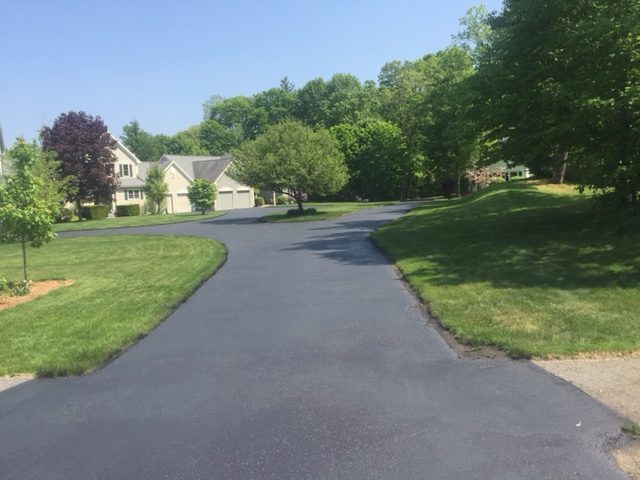Cold Mix Asphalt Vs. Hot Mix Asphalt: Which Is Right for You?

Make-up Differences
Cold mix and warm mix asphalts differ significantly in their structure, with distinctive qualities that affect their performance and applications. Cold mix asphalt is generated by emulsifying the asphalt binder with water and an emulsifying representative before mixing it with accumulation. This method enables the asphalt to be convenient at reduced temperature levels, making it excellent for momentary fixings and for usage in colder climate condition. Warm mix asphalt, on the various other hand, is made at heats, normally between 300-350 ° F, which helps to accomplish much better compaction and a much more durable end product. The warm mix asphalt manufacturing procedure includes heating up the aggregate and asphalt binder individually prior to combining them at the asphalt plant.
In addition, chilly mix asphalt has a tendency to be much less dense and more adaptable than hot mix asphalt. This flexibility makes it better matched for locations with higher levels of activity, such as driveways or roadways with hefty web traffic. In comparison, warm mix asphalt is understood for its high longevity and resistance to rutting and fracturing, making it a recommended selection for freeways and high-traffic roads where durability is essential.
Setup Process Variances
The procedure of installing chilly mix and hot mix asphalt displays notable variations in their treatments and requirements. In contrast, warm mix asphalt demands a more sophisticated installation process. Due to the heating requirements, hot mix asphalt installments are generally brought out by specialists with customized tools, making sure an extra irreversible and structurally sound result.
Sturdiness and Long Life Variables
When thinking about asphalt options, durability and durability are vital aspects to assess for lasting sidewalk performance. Warm mix asphalt (HMA) is understood for its extraordinary resilience and longevity.
In terms of longevity, HMA usually exceeds CMA due to its exceptional strength and resistance homes. HMA sidewalks have a longer life span, requiring less constant repair services and maintenance, which can basics equate to set you back savings in the future. Furthermore, HMA sidewalks are much more conveniently adjustable to meet details project demands, better boosting their resilience.
Price Considerations
Considering the financial implications is an essential aspect when assessing the option between hot mix asphalt (HMA) and cold mix asphalt (CMA) for pavement projects. While the first price of warm mix asphalt is commonly greater than that of cool mix asphalt, HMA frequently offers a much more affordable solution in the long run due to its remarkable longevity and long life.
In addition to material prices, it's necessary to consider the expenditures connected with setup and my review here maintenance when contrasting HMA and CMA. Ultimately, the choice between HMA and CMA must take right into account not just the initial price but likewise the lasting financial ramifications to determine the most economical option for the particular sidewalk job.
Environmental Influence Comparison
Contrast of the ecological impacts in between hot mix asphalt (HMA) and chilly mix asphalt (CMA) exposes distinctive differences in sustainability methods. HMA production requires heats, bring about increased power consumption and greenhouse gas discharges. The process additionally launches volatile natural substances (VOCs) and unsafe air pollutants (HAPs) into the environment. In contrast, CMA is created and used at reduced temperature levels, reducing energy use and emissions considerably. The reduced manufacturing temperature levels of CMA result in decreased fuel intake and reduced degrees of carbon dioxide exhausts, making it an extra eco-friendly alternative.
In wikipedia reference addition, the usage of CMA typically involves reusing existing asphalt pavement, promoting source preservation and decreasing the amount of waste sent to garbage dumps. By opting for CMA over HMA, road construction tasks can contribute favorably to environmental preservation efforts.
Verdict
In verdict, the choice in between cold mix asphalt (CMA) and warm mix asphalt (HMA) depends upon numerous elements such as structure, installment process, sturdiness, long life, cost, and environmental effect. asphalt patch repair. While CMA supplies a affordable and fast service for small repairs, HMA guarantees premium resilience and long life for rush hour locations. Take into consideration these variables thoroughly to establish which kind of asphalt is the right option for your paving needs

Taking into consideration the monetary effects is an important facet when evaluating the choice in between warm mix asphalt (HMA) and cold mix asphalt (CMA) for sidewalk tasks. While the first price of hot mix asphalt is typically higher than that of chilly mix asphalt, HMA frequently provides an extra cost-effective option in the lengthy run due to its remarkable durability and long life. asphalt patch repair.Contrast of the ecological impacts in between warm mix asphalt (HMA) and cool mix asphalt (CMA) reveals distinct distinctions in sustainability methods.In verdict, the selection in between cool mix asphalt (CMA) and hot mix asphalt (HMA) depends on different variables such as make-up, installation process, resilience, durability, price, and ecological influence